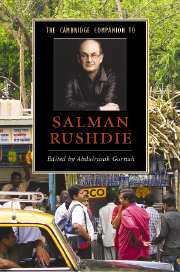4 - The fatwa and its aftermath
from Part I: - Themes and Issues
Published online by Cambridge University Press: 28 November 2007
Summary
‘'A poet's work,' he answers. 'To name the unnameable, to point at frauds, to take sides, start arguments, shape the world and stop it from going to sleep.' And if rivers of blood flow from the cuts his verses inflict, then they will nourish him.’
Few novels have had such an influence on world affairs, or engendered such divergent, interpretive communities and views that have continually changed. Gayatri Spivak identified the implied multi-levelled readers of Rushdie's novel The Satanic Verses as the international, postcolonial migrant readerships:
This is not the Christian enlightenment person for whom British literature is written; nor the jaded European of 'The Wasteland' . . . if you read it from the point of view of a 'secular Muslim' (Rushdie) is trying to establish a (post) colonial readership - already in existence - who will share a lot of the echoes in the book from Hindi films . . . that you and I might miss.
. . . Rushdie was trying to create a post-colonial novel, from the points of view both of migration - being in Britain as Black British - and of decolonization.
Yet some of the contradictions of the term 'secular Muslim' emerged in the diverse responses to the publication of the novel, as we shall see. Those who interpret the novel as blasphemy object chiefly to two chapters in the book. One of the protagonists of the novel is the Indian actor Gibreel Farishta, who suffers schizophrenic dream-sequences in which God reveals his will to the Prophet. A scribe named Salman writes down God's commands as they come from the lips of Mohammed, and he decides to play a trick by changing some of the divine words.
- Type
- Chapter
- Information
- The Cambridge Companion to Salman Rushdie , pp. 45 - 60Publisher: Cambridge University PressPrint publication year: 2007
- 4
- Cited by

